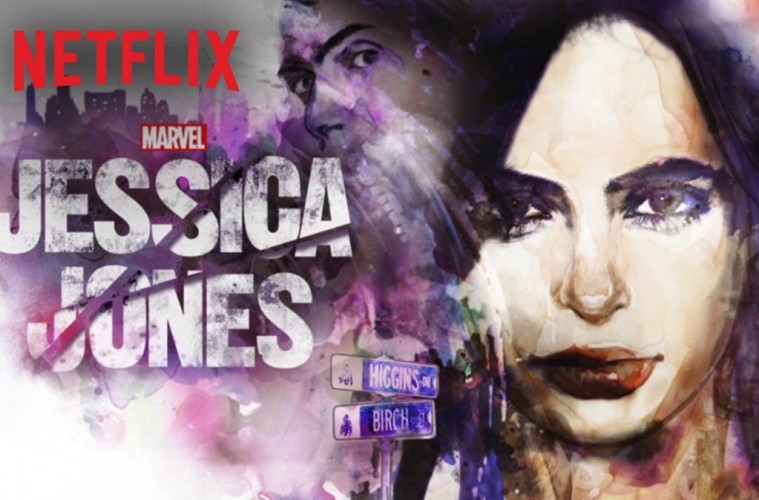Jessica Jones is Marvel Studios hedging its bets. It doesn’t walk, talk, or look like a conventional superhero TV show. This is a crime drama for the inevitable superhero pushback, some delicious noir for those who’ve gotten tired of spandex and want to see new corners of Marvel.
Jessica (Krysten Ritter) is a seedy detective with a bottle of Jack Daniels in her desk and a questionable commitment to the law. She swaggers like a more depressed Iron Man and schemes like a less polished Black Widow. Whether or not she’s actually a “superhero” rather than a run-of-the-mill protagonist is sort of immaterial as she has special abilities and even sometimes uses them to catch the bad guys.
Her powers, though, just aren’t very central to the story. Of the show’s flaws, Jessica’s super strength is present but often inconsistent: she can stop a car one episode and then get thrown three yards by one the next. Considering the themes of trauma and self-doubt, this may be woven into the fabric of her character.
What jokes there are are sardonic, the view of human nature is cynical, and Jessica herself is trying to shake the feeling that she’s damaged goods. This is due to an abusive relationship with Kilgrave (David Tennant), a man who can command anyone to do anything as long as he speaks to them in person. In many ways, he’s a brilliant villain; a super-powered, spoiled man-child who has never been forced to develop empathy with anyone. In other ways, his presence and the implication of what he had Jessica do while she was under his control for months shows the deeply disconcerting horror that the show is capable of. Krysten Ritter depicts Jessica’s pain with past sexual violence viscerally. The show is a fast watch, but it’s dark and melancholy. How does this fit in with a world where Captain America runs around in tights?
It is precisely because the Marvel Cinematic Universe feels so big that Jessica’s story works. In Afghanistan, a kidnapped Tony Stark once built a robot suit to escape his captors (Iron Man); out in space, a cybernetically enhanced intelligent raccoon is crying over his beer (Guardians of the Galaxy); somewhere on Earth, the alien Norse god of thunder is romancing an astrophysicist (Thor). In a universe where everything is happening somewhere, there are different suspensions of belief, different rules. Jessica offers a grittier and more complicated view of the Marvel-verse.
Kilgrave, for example, due to what I suspect is his own lack of maturity, will never be as big-time as Loki. No, he lurks in the back allies and New York City gutters just as Jessica does. People, it seems, have largely ignored Jessica’s super strength because she’s really just not as spectacular as a man who can become a green giant.
Another way the show grounds us is by providing the Marvel Cinematic Universe with another female character. In developing its more male-centered properties, Marvel Entertainment now is scrambling to re-balance the genders of their main characters. Female characters have always been there, of course—sassy but soft-hearted Pepper Potts (Gwyneth Paltrow), assassin-with-a-heart-of-gold Black Widow (Scarlett Johansson), assassin-with-a-heart-of-gold-but-also-an-alien Gamora (Zoe Saldana), and S.H.I.E.L.D. pioneer Peggy Carter (Hayley Atwell)—but at least in the films, they’re mainly in roles supporting the main male characters. They all have great moments, but they’re often defined by how romantically involved they are with their co-stars.
The core problem isn’t these women as individual characters and whether or not they’re well rounded. Peggy, for example, entered the Marvel-verse as Captain America’s slighted girlfriend but now has her own show, Agent Carter. No, the problem is that there just needs to be more women from more diverse backgrounds, moral systems, and capabilities, period, to give the sense of a fully-developed universe. Misanthrope Jessica Jones offers an enormously satisfying alternative beyond tragic assassins and chipper girlfriends.
Now this isn’t to say everything works for me in Jessica Jones. Claire Temple (Rosario Dawson) is great, but she ends up being a stand-in for all women of color in New York City. The fight scenes could benefit from stronger camera framing. Jessica’s affair with Luke Cage (Mike Colter) brings out the stalker in her. Jessica herself may not be an audience favorite, either, as she spends much of the season being unpleasant and acting hassled because she has to help people.
But that’s one of the many reasons I liked watching the show. Jessica isn’t helping people because she’s a snarky Iron Man type but because she’s actually a bit more like Captain America: duty first. She forgoes the spangly outfit, but she has the instincts of a brightly clothed do-gooder. Among the differences between her and Kilgrave, she uses her powers not because she wants to but because she has a responsibility to help people out of messes even if she isn’t emotionally prepared to do so yet. My pet theory on her fluctuating strength levels is that they’re directly tied to her confidence and sense of self-worth. She weakens when she feels inadequate. Her jumping, also, seems like aborted attempts to fly; as if she’s unlocking her potential after the entire world dismissed it.
Jessica Jones is what the Marvel Cinematic Universe needs: a thing that’s similar enough in shape but different in scope. Recently, the show was renewed for a second season, which is promising for both the show and Marvel. If audiences really do push back against superheroes, few will find anything to complain about a badass taking her life back from an asshole not worth the dirt under her shoes. Jessica Jones is Joan Jett walking into a bar, ignoring all the Iron Man bros playing darts behind her. This is her night and she’ll be doing what she wants, thanks.
Featured image via Forbes.


